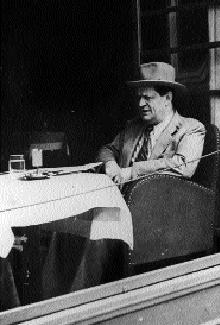
Frigyes Karinthy: A Journey Round My Skull. Translated from the Hungarian by Vernon Duckworth Barker, with a preface by Mihály Sükösd. Budapest, Corvina Books, 1992, 288 pp.
In early May 1937 Budapest’s dailies gave equal space to Addis Abeba and Stockholm: Benito Mussolini had invaded Ethiopia and Frigyes Karinthy had had a life-threatening tumour removed from his brain by a Swedish surgeon. Karinthy, an enormously popular Hungarian humourist, gave a detailed account of the progress of his illness and its cure in A Journey Round My Skull, published the following year in Hungary and the year following that by Faber & Faber in England.
The republication of Vernon Duckworth Barker’s fluid translation of the work in Corvina’s Hungarian Classics series is welcome both in and of itself and as a measure of certain changes that have taken place since the work’s first appearance. Last year The New Yorker ran a moving personal account of a stroke and its cure. The author was the English novelist Robert McCrum, who also happens to be an editor at Faber & Faber and may well have been involved in the transfer of rights of the Karinthy book from his firm to Corvina. In other words, he may well have read A Journey Round My Skull a few years before taking his own analogous journey.
 |
It is interesting for a completely different reason as well. McCrum’s account—coming to us as an article in a periodical and immediately after the illness occurred—has the ring of fact to it; Karinthy’s account, coming to us as a full-length book and more than half a century after his illness occurred—has taken on a literary patina. On the one hand, Karinthy insists that “reality as a genre requires no helping hand from the artist”; on the other, his is nothing if not a high self-conscious literary construct. He even inserts an entire short story (about a patient at an insane asylum, (“Moni”) in the text.
If McCrum represents a possible descendant, the largely forgotten French writer Xavier de Maistre represents a possible ancestor. In Voyage autour de ma chambre (A Journey Round My Room, 1795) de Maistre moves from a minute description of the premises where he was kept for several months under house arrest (for having fought a duel) to wide-ranging artistic and philosophical meditations (which the young Tolstoy found worthy of emulation). Karinthy gives a minute description of his “skull”, a description that covers both the physical and psychological: the early giddy spells and the later excrutiating headaches, the attemps at denial and the realization that even after submitting himself to examination, he had unconsciously chosen doctors incapable of diagnosing the illness he knew was there. But he also incorporates his readings (Thomas Mann’s Joseph and his Brethren, Scott’s account of his journey to the South Pole, Jules Verne’s Michel Strogoff) and a variety of philosophical musings.
Which does not make him particularly “heavy”. Like so many of his Austro-Hungarian contemporaries, Karinthy was a denizen of, even a creature of the café, both writing and holding court at his Stammtisch, the table regularly reserved for him and his coterie. The narrator of A Journey Round My Skull couches his speculations in an insouciant, man-of-the-world chatter, taking special pleasure in debunking one and all, himself included. One of the reasons he waited so long to go to a doctor, he tells us, is that he feared fear of the illness more than the illness itself. True, the musings grow more serious as the action progresses (Karinthy is often quoted as having said, “When it comes to humour, I’m in dead earnest”), and they culminate in a disquisition on the subjectivity of time, but even here he maintains his engaging tone.
In the end, the work is satisfying as much for the narrator as for what he narrates. What a pleasure to sit down with a witty, urbane, eminently well educated human being, to bask in his presence as he recounts to you something of vital importance to him. We could do with a few more Karinthys nowadays.
Michael Heim
is Professor of Slavic Languages and Literatures at the University of California, Los Angeles. He has translated works by a number of authors including Péter Esterházy, Bohumil Hrabal, Danilo Kisÿ, György Konrád, Milan Kundera and Dubravka Ugresÿic´.
SOURCE: Heim, Michael. “A Writer on His Head” [review of A Journey Round My Skull], The Hungarian Quarterly, Volume XXXVIII, No. 145, Spring 1997.
“Frigyes Karinthy, Humorist and Thinker” by Miklós Vajda
Grave and Gay: Selections from His Work by Frigyes Karinthy
Frigyes & Ferenc Karinthy in English
Frigyes (Frederiko) Karinthy (1887-1938) en Esperanto
Science Fiction & Utopia Research Resources: A Selective Work in Progress
Alireteje: Offsite:
Frigyes Karinthy @ 50 watts
Home Page | Site Map
| What's New | Coming
Attractions | Book News
Bibliography | Mini-Bibliographies
| Study Guides | Special
Sections
My Writings | Other
Authors' Texts | Philosophical Quotations
Blogs | Images
& Sounds | External Links
CONTACT Ralph Dumain
Uploaded 30 April 2016
Site ©1999-2023 Ralph Dumain